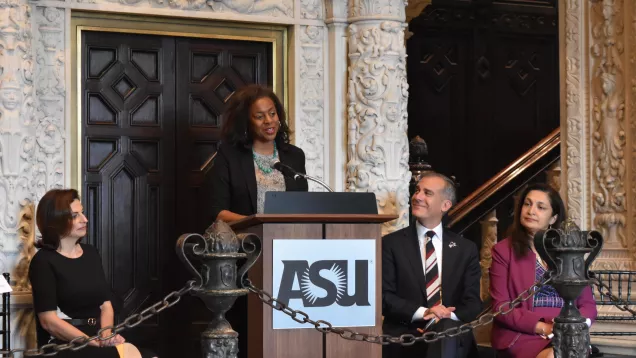
LOS ANGELES - City officials, officials from the U.S. Department of State and the U.S. Agency for International Development, academic experts, and policymakers from across the Americas gathered downtown today for a discussion on violence prevention co-hosted by Mayor Eric Garcetti, the Civil + Human Rights and Equity Department (LA Civil Rights), the Strong Cities Network, the Violence, Inequality and Power Lab at the University of San Diego, and the McCain Institute at Arizona State University. The four-hour roundtable resulted in a group declaration for continued partnership on violence prevention and safeguarding democratic principles.
“Leaders from across the Americas have come together this week around solutions to our shared challenges. including preventing violence in our cities — a top priority for every mayor,” said Los Angeles Mayor Eric Garcetti. “This gathering provided a meaningful opportunity for us to share strategies for building the trust that is essential to public safety, creating resilient networks within and across communities, and ensuring our residents have access to the resources they need to thrive.”
“Today was an important opportunity to meet with Mayors across the Americas to discuss strategies to reduce and prevent violence. We all understand the need to prioritize a public health approach to dealing with all forms of violence. The Biden-Harris administration has made this a priority through its commitment to support community violence prevention programs here in the U.S. and in Latin America and the Caribbean,” said U.S. Department of State Under Secretary for Civilian Security, Democracy, and Human Rights Uzra Zeya.
The event opened with a panel discussion featuring mayors from Villa Nueva, Guatemala; Puerto Barrios Guatemala; Moravia, Costa Rica; Bogotá, Colombia; Port of Spain, Trinidad; Denver, Colorado and Chattanooga, Tennessee, moderated by the LA Civil Rights Director of Policy and Enforcement Joumana Silyan-Saba. The day continued with a series of roundtables, where more than two dozen experts and elected leaders from more than 11 countries shared best practices, direct experiences, and multilateral strategies for violence prevention and reduction.
"The prevention of violence is one of the cornerstones of the Bogotá that we are building,” said Bogotá Mayor Claudia López. “We're working on this via three lines of action. First, we are guaranteeing full access to justice to avoid impunity and to ensure guarantees for victims. Second, we are strengthening actions taken by authorities to maintain greater harmony in the city. Lastly, we are providing opportunities. Employment, care, and a decent life are the best tools to prevent violence. The right to a safe space means the right to a better future"
“So much of what we do at LA Civil Rights - from addressing hate to expanding equity - is violence prevention,” said LA Civil Rights Executive Director Capri Maddox. “LA Civil Rights is eager to share what we have learned, and to hear from leaders from across the Americas on how we build safe, inclusive and equitable communities. We are honored to co-host today’s Summit of the Americas event, and to have violence prevention experts like Joumana Silyan-Saba on our team."
Eric Rosand, Executive Director of the Strong Cities Network (SCN), a global network of 150+ cities dedicated to addressing all forms of extremism, hate and polarization that can lead to violence, noted the importance of the roundtable “in elevating the crucial roles that cities and local leaders play in violence prevention efforts and strengthening social cohesion and resilience.”
The leaders gathered as violence, including identity-based violence and mass shootings, rise across the United States. Across the globe, issues of displacement, regional conflict, and the rise of trans-national violent groups threaten the security and economy of democratic societies.
Although various forms of violence require specific tools of analysis and response, evidence has also made clear that violence in society is nearly always interconnected, very often reinforced through systems of discrimination and exclusion, and manipulated by narratives of hate and othering. The event focused on strategies that promote social cohesion and resilience, safeguard democratic principles, and promote inclusive and equitable societies through the application of violence prevention strategies.
The event highlighted innovative approaches on violence prevention and social cohesion, meant to support governments and non-governmental organizations (NGOs) at the local level. Following the meeting, attendees committed to work together across networks on violence prevention, including mental and emotional health support, collaboration on integrated prevention strategies, and promoting inclusive and equitable societies.
The co-hosts will prepare a white paper for wide dissemination that captures the lessons learned and good practices identified and shared during the side-event, and which will inform SCN’s follow-on activities, including through a dedicated working group that will target city-level violence prevention practitioners across the network and beyond.